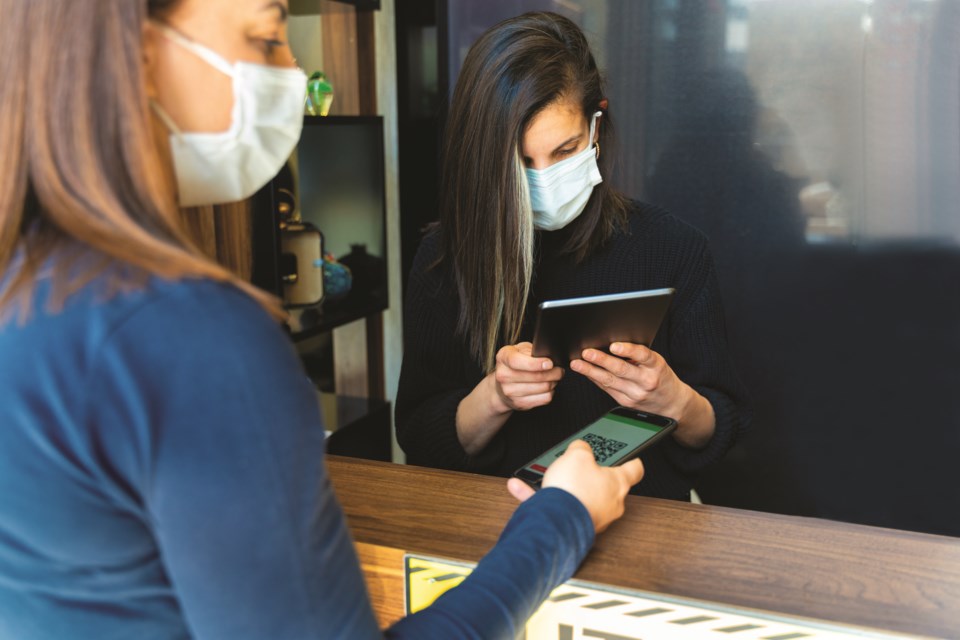In certain instances, it’s fair to say no news is good news, and in the case of B.C.’s newly implemented vaccine card, that’s been the story for Whistler Chamber of Commerce CEO Melissa Pace.
“[Businesses] haven’t been calling me, so it’s good news to not hear from people at this point for this particular reason,” she said after Day 1 of the province-wide requirement to show proof-of-vaccination status to enter non-essential public spaces, like restaurants, bars, concert halls and gyms.
Launched on Sept. 13, the program has so far proven to be relatively straightforward for local establishments—although the full scope of the initiative is likely to take shape in the coming weeks.
“It’s been pretty smooth so far, from what I’ve heard,” said Restaurant Association of Whistler (RAW) president and Alta Bistro co-owner Eric Griffith. “We’re just trying to assess if there is going to be any pain points for our staff and if it’s going to be difficult or if it’s going to slow things down at the door. We’ve only done Monday night.”
For full or partially vaccinated B.C. residents, a paper copy or digital version of their QR code is shown at the entrance to establishments alongside a valid piece of government photo ID. The QR code can be scanned through the Verifier app, or visually checked—with blue indicating one dose, and green indicating two doses.
Out of-province guests, meanwhile, will show an officially recognized vaccine record as well as valid government photo ID. International visitors will display the proof of vaccination they used to enter Canada, along with their passport, and can store all mandatory travel information on the ArriveCan app available for iOS, Android and online.
Griffith noted he had heard word from restaurants of out-of-country guests being unaware of the new proof-of-vaccination requirements, which makes it imperative that the correct messaging is reaching international markets prior to visitors’ arrival.
“Once they arrive at the airport, they’ve probably gone through most of what they need to know to get into different communities, but still, we want that communication and messaging piece to support that guest coming here so they know what to expect,” said Pace.
That was reiterated by Hotel Association of Whistler chair Saad Hasan, who said hotel guests have generally been aware of the requirements because they are informed at the booking stage and again when checking in. (Hotels do not have to check vaccine status—except in on-site restaurants and fitness facilities, if they are open to the wider public.)
“There’s a slight difference in being in a hotel environment and having it all provided to you ahead of time … [versus] a restaurant, where you’re walking down the street and suddenly want to go in and the restaurant says no,” he said. “Certainly I haven’t heard from any of our members as yet where there has been any kind of conflict.”
Although there have been no significant reports of pushback so far, the potential for conflict remains a concern for restaurants, particularly at a time when frontline staff are in short supply and those that are working are feeling the weight of ever-changing health protocols.
“We’re optimistic that things are going to go smoothly. That’s what our group is hoping because we don’t want any more hassle,” Griffith said. “We want a nice, smooth transition to make this the new normal thing we’re doing.”
Sea to Sky Officer-in-Charge Insp. Robert Dykstra said the local detachment hasn’t received specific guidance on enforcing the new vaccine card measures, so the force is taking a “keep-the-peace” approach.
“If establishments have issues with people … not wanting to show a vaccine card and then causing issues for not being admitted, the bars, restaurants and other establishments can call the police,” he added. “Until we get some direction exactly as to how it is to be enforced, we’re approaching it from that perspective.”
While he agreed the process has gone off without any major hitches so far, Jay Pare, co-owner of Caramba and Quattro, indicated that the added layer of verification at the door has required an additional staff member, or a manager removed from their regular duties as the rest of staff gets trained on the vaccine card implementation.
“You can’t check [diners] in, see if you have a table, answer the phone for a takeout order and all of that stuff. It’s too much,” he said.
Pace said the Whistler Chamber has joined the wider B.C. chamber network in advocating for government funding to cover the additional labour costs as well as for training staff in “conflict management and enhanced customer service skills” to manage the program.
“We definitely want to see this being a government initiative and not led on the heels of businesses having to police it, and also to ensure it’s a short-term, not long-term [program]. That’s really important.”





